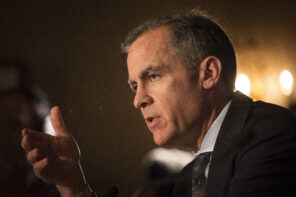As part of a series called “The Academics,” The Bull & Bear is sitting down with beloved professors from a variety of departments, learning about them and gaining insight on the classes they teach. In the midst of planning for the next semester, we hope these interviews add dimension to your schedule and get you excited (or just decided) about the year ahead.
Manuel Balán is a professor in the Political Science and International Development departments.
The Bull & Bear: First and foremost, where are you from, and how did you come to do what you do?
Manuel Balán: I’m from Buenos Aires, Argentina. I changed paths quite a few times since I finished high school. In Argentina, the system is similar to the French system, so you have to choose right after high school what you want to study. You go directly into one program and you only study that. My choice, weirdly enough, was economics and so I studied economics as an undergraduate. When I was halfway through, I realized it wasn’t for me. I wasn’t enjoying classes. I still wanted to finish, so I kept moving forward, but I started going to law school too, which in Argentina is an undergraduate degree, usually designed to take about 6 years.
I didn’t particularly enjoy law school either, so I decided that I wanted to switch again, this time into Political Science. At that point I was mostly interested in human rights and constitutional theory, which was linked to political theory. I applied to Political Science PhD programs in the US, with the idea to focus on political theory. I went to the PhD program in Political Science (called Government) at the University of Texas at Austin, where I quickly switched focus once again, moving on to work in comparative politics and research methods. After finishing my PhD I was hired by McGill as a joint appointment between Political Science and International Development.
B&B: How does your background influence your approach to political science?
MB: I think my interdisciplinary background made me into a non-mainstream political scientist. I went through different paths, so the type of research and teaching that I do in political science now is not as mainstream as you would think. In particular the research that I do is never on very easy-to-categorize themes that fit sub-disciplines in a very neat way.
When I went for my PhD I thought, ‘I want to do research on anything but corruption.’
B&B: When did you narrow down your research interests to Latin American corruption? And why?
MB: I grew up in the 90s in Argentina, during the Menem years, so corruption scandals abounded. Corruption was very much on top of the political agenda, something you would read on the news and hear about on radio and television all the time. When I was in law school, I had my first couple of jobs, and some of them were in transparency and anti-corruption policy, first at a couple of NGOs, and then in the government at the anti-corruption office. From there, given the trajectory of the anti-corruption office, I became deeply disenchanted with anti-corruption policies and issues, which is why when I went for my PhD I thought, “I want to do research on anything but corruption.” But, sometimes these things don’t work out as expected, and reality catches up with you.
B&B: So would you say it was… fate?
MB: I don’t know if fate… I think the decision to focus my research on corruption had to do with an obvious interest I had on these topics as well as a somewhat strategic choice. When you’re doing a PhD, you have to invest a lot of time and effort into your research topic. In my case, when I was defining my research area, I realized I had certain comparative advantages when it came to corruption. Sometimes these advantages aren’t just analytical, they’re also about the issues that you have more exposure to and that you know the most about, and what I knew the most about was corruption. And so, when it came time to decide what topic I was going to do for my dissertation, very soon it became clear that it had to be related to corruption. I did take it in a different angle and did something that was different from what I’d done before, but it was building on a body of knowledge that I already had coming in. This is where path dependency is really strong, even when moving from the professional to the academic world, where you build you specialty. Your background sometimes defines where you end up, and that was my case.
B&B: Of all your past work, is there one piece or project of which you’re particularly proud?
MB: As an academic, I’ve come to the realization that most of our actual impact and relevance comes not so much in what we write, but more in terms of our public engagement in terms of teaching, and in my case, policy work. This may not be the most valued in an academic career, but the most impactful things that I’ve done are first, the students that I’ve taught and the people that come to my class, and second, my engagement with the real world–trying to bring things that I’ve learned through research to policy design and implementation.
B&B: In terms of teaching, would you say you have a distinctive teaching style? How has it evolved through the years?
MB: I think we all do… I think everyone has their own style. And yes, it did develop through the years. As professors, we all need to find our own personas when we teach, and we need to find a style and a way of interacting with students and content that is comfortable and true to ourselves. There’s not one way of teaching, even the same class; you need to find who you are… and be comfortable in order to be good at it. There’s not only one way to teach, or one way that is better than others. You need to realize what works for you and try to develop your own teaching style.
The most impactful things that I’ve done are first, the students that I’ve taught and the people that come to my class, and second, my engagement with the real world.
B&B: So, what’s your way?
MB: I’d say there’s two main things that I, and most instructors, have to think about. One is knowing yourself and what feels comfortable to you. The second one is being able to learn from mistakes and correct what you do as an instructor. You may have certain reactions to some situations that aren’t ideal, and I’d say part of being an effective instructor is to be able to adjust and revise what you do. In terms of my own teaching style, I’d say it is driven by a couple of things. First, I want the class to be a welcoming environment for students. I think this goes a long way to improving the overall learning (and teaching) experience. I’d say this part comes fairly easy and natural to me. I think I’m not threatening, so my sense is that students tend to feel comfortable in my classes, whether this means speaking up and asking questions, or voicing their disagreement with the content of the specific lectures or classes. Second, and relatedly, I think generating a welcoming environment allows me to challenge students, but to do so–again–in a non-threatening way. I want students to be challenged, but not afraid. I want to make them think and challenge them to articulate their thoughts, but I’d like to think that this can be done in a way that is not stress-inducing for students.
B&B: Could you share with us a significant memory of yours from teaching?
MB: Because of cognitive biases that we all have, we usually tend to remember bad moments… the things that really have stuck in terms of teaching are not particularly my best moments. Rather than telling you exactly what those moments are, I’ll tell you the main theme: I come from a different place, and this means that even though I feel very comfortable in English, this is not my first language, and there are also some other cultural differences. For instance, political correctness is not a big thing in Argentina. This combination of language and not being particularly politically correct has put me in some awkward situations. Basically, there are some subtleties that are perhaps harder for me to manage sometimes. I don’t think I’ve ever offended anyone, or at least I hope that’s the case! But let’s just say that I remember a number of these moments, and while some are funny, they are not particularly good memories.
I want students to be challenged, but not afraid.
B&B: If you could do it all over again, what other field would you be interested in teaching?
MB: This is gonna sound odd, and this is probably based on the fact that I have small kids, but more than teaching in a different field, I think I’d be interested in early childhood education. It is certainly really important. And the rewards are very high (the salary, not so much)… You see the impact of stuff that you expose kids to in a really unbelievable way.
B&B: What about another career besides teaching?
MB: I do have to say that this is something I think about quite often. Some people have a hard time thinking of themselves being outside academia and being fulfilled. That is not really my case. I think I could have gone in a number of different paths. I am happy in academia and I like my job, but for me it was never ‘written in the stars.’ I don’t think I could have been a lawyer even though I studied law…I guess I always fantasized about being a chef, but as is usually the case with these daydreams, they are based on an idealized view of what’s on the other side. Then you hear from chefs, and the crazy workload they manage, the stress and tension, and the thought becomes way less appealing. I think academia is a very fulfilling career, and that if you’re smart in setting boundaries, it can allow for a good work-life balance. I don’t think that is as common as we sometimes assume it is. On another note, when I was a kid I played tennis competitively, so growing up I guess my dream was to be a tennis player.
B&B: Last, but not least, what’s one thing you wish your students knew about you?
Giving students low grades gives us zero satisfaction.
MB: I think it’s important for students to know that we professors are here to help you, not to give you bad grades, find your shortcomings, or anything like that. We are not your enemy. We are certainly not what is standing between you and a perfect 4.0 GPA. [Thinking that we are] is not a productive way to think about us Profs. We–or at least I–became professors because we value and enjoy doing research and teaching students. We want you to do well in our classes; we want you to learn. Giving students low grades gives us zero satisfaction… in fact, my ideal outcome would be one in which everyone excels in my classes and does fantastic work. I may have to give everyone As, which would get me in some trouble with the University, I guess. But that would be a great problem to have. So in short, I’d like students to know that we want you to do well in class, that we want you to learn lots, to think critically and challenge what you learn, and to generally get as much as possible from your educational experience.








